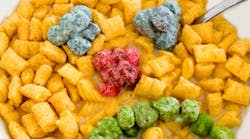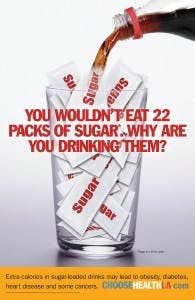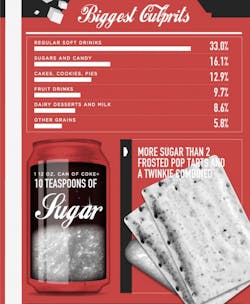Sweetness or white poison?
We are finding that the consumption of sugar is not so sweet! Sugar comes in many forms, including high-fructose corn syrup, fructose, fruit juice concentrates, honey, sugar granules, syrup, corn syrup, sucrose, and dextrose. A recent article discussed how the National Caries Program was not successful in advancing a scientific understanding of how to restrict sugar consumption to prevent tooth decay. (1) The National Caries Program was a product of the (then) National Institute of Dental Research (NIDR). In the late 1960s, the National Institutes of Health (NIH) stated that decreasing sugar ingestion was not practical for the public’s health, while theoretically a sound premise. This article will delve into the dangers of sugar ingestions.
READ MORE |The sugar industry’s influence on dental research
READ MORE |WHO calls on countries to reduce sugars intake among adults and children
This issue is not just a concern for the United States. A 2015 study of European adults determined that the ingestion of soft drinks, sweetened milk beverages, and energy from total sweet beverages was related to higher type 2 diabetes risk by themselves, even without the influence of body fat. (4) Water or unsweetened tea and coffee appear to be appropriate substitutions to sugar-sweetened beverages.
The study found that compared with people who drink only one sugar-sweetened drink per day, those who drink water, coffee, or tea as an alternative are at 14% lower risk of developing type 2 diabetes. (4) Surprisingly, drinking fruit juice and sweetened tea or coffee was not associated with diabetes. (4)
READ MORE |Deciduous teeth myths, and the effects of parents on childhood oral hygiene
A brand-new study found that ingesting sugar-sweetened drinks can suppress cortisol and stress responses in the brain, but diet beverages sweetened with aspartame do not have the same effect. (5) This is the first study to show that sugar’s stress-relieving properties can perhaps leading to over consumption and habituation, increasing the risks of sugar, such as obesity. These results help us to understand why some people are tempted to eat sugary comfort food when they feel stressed. (5)
Recent research illustrates that the risk of cardiovascular disease increases as the amount of added sugar consumed increases. (6) Even when young, healthy men and women ingested added sugar for, their risk factors for cardiovascular disease were considerably increased. (6) The risk factors for cardiovascular disease, specifically lipid profiles, were greater in men than in women and were independent of body weight gain. (6)
Many studies have shown that added sugar is bad for one’s health. Reducing all sugar consumption is desirable, especially highfructose corn syrup. (7) In the American diet, 44% of the added sugar is sucrose, 42% is highfructose corn syrup, and the remaining 14% includes honey, molasses, juice concentrates and agave. (7) The remaining 14% combine fructose and glucose, known as dextrose. Globally, highfructose corn syrup is only about 8% of added sugar consumption. On a positive note, Burger King removed soft drinks from their kids’ menu, offering milk and 100% apple juice instead. Fast-food chains are trying to contribute to fight childhood obesity. (8)
References
1. Kearns CE, Glantz SA, Schmidt LA. Sugar industry influence on the scientific agenda of the National Institute of Dental Research’s 1971 National Caries Program: A historical analysis of internal documents. PLOS Med. 2015;12:e1001798. doi: 10.1371/journal.pmed.1001798.
2. United States Department of Agriculture. Profiling Food Consumption in America. Agriculture Fact Book. http://www.usda.gov/factbook/chapter2.pdf. Accessed June 2, 2015.
3. Ruxton C, Gardner EJ, McNulty HM. Is sugar consumption detrimental to health? A review of the evidence 1995–2006. Crit Rev Food Sci Nutr. 2010;50:1-9.6.
4. O’Connor L, Imamura F, Lentjes MA, Khaw K, Wareham NJ, Forouhi NG. Prospective associations and population impact of sweet beverage intake and type 2 diabetes, and effects of substitutions with alternative beverages [published online ahead of print May 6, 2015]. Diabetologia. 2015.
5. Tryon MS, Stanhope KL, Epel ES, et al. Excessive sugar consumption may be a difficult habit to break: A view from the brain and body [published online ahead of print April 16, 2015]. J Clin Endocrinol Metab. 2015.
6. Stanhope K, Medici V, Bremer AA, et al. A dose-response study of consuming high-fructose corn syrup–sweetened beverages on lipid/lipoprotein risk factors for cardiovascular disease in young adults [published online ahead of print April 22, 2015]. Am J Clin Nutr. 2015.
7. Ruff JS, Hugentobler SA, Suchy AK, et al. Compared to sucrose, previous consumption of fructose and glucose monosaccharides reduces survival and fitness of female mice. J Nutr. 2015;145:434-41. doi: 10.3945/jn.114.202531.
8. Horovitz B. Burger King drops soft drinks from kids’ meals. USA Today. March 10, 2015. http://www.usatoday.com/story/money/2015/03/09/burger-king-fast-food-restaurants-soft-drinks-beverages/24661959/. Accessed June 2, 2015.



